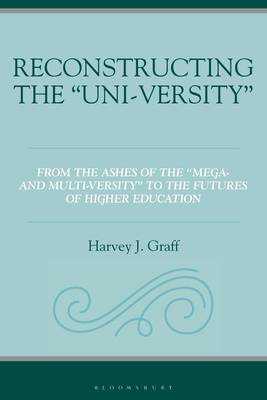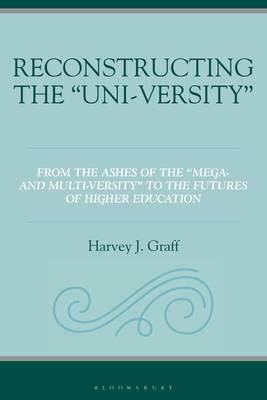
- Afhalen na 1 uur in een winkel met voorraad
- Gratis thuislevering in België vanaf € 30
- Ruim aanbod met 7 miljoen producten
- Afhalen na 1 uur in een winkel met voorraad
- Gratis thuislevering in België vanaf € 30
- Ruim aanbod met 7 miljoen producten
Zoeken
Reconstructing the "Uni-versity"
From the Ashes of the "Mega- and Multi-versity" to the Futures of Higher Education
Harvey J Graff
Hardcover | Engels
€ 220,45
+ 440 punten
Omschrijving
Slogans, myths, and isolated anecdotes are inadequate substitutes for documented history and contextual understanding.
Literature on the history of higher education is dominated by ahistorical and contextually ignorant slogans. Seldom acknowledged, in discussions of the "decline" or "failure" of the modern university, is 1) how long it has been going on (at least since the 1960s); and 2) universities' own complicity in this long, complicated, and contradictory process. Myths intertwine inseparably with slogans to echo yet another "lost cause." Our collective, as well as individual, pasts provide essential lessons if we know how to read and learn from them. More complicated is imagining a plausible better future for universities. In Reconstructing the "Uni-versity" From the Ashes of the "Mega- and Multi-versity" to the Futures of Higher Education, Harvey J. Graff, bringing experience from over 50 years as a professor, provides an accurate history of higher education, redefining the issues and terms to establish a new agenda.
Literature on the history of higher education is dominated by ahistorical and contextually ignorant slogans. Seldom acknowledged, in discussions of the "decline" or "failure" of the modern university, is 1) how long it has been going on (at least since the 1960s); and 2) universities' own complicity in this long, complicated, and contradictory process. Myths intertwine inseparably with slogans to echo yet another "lost cause." Our collective, as well as individual, pasts provide essential lessons if we know how to read and learn from them. More complicated is imagining a plausible better future for universities. In Reconstructing the "Uni-versity" From the Ashes of the "Mega- and Multi-versity" to the Futures of Higher Education, Harvey J. Graff, bringing experience from over 50 years as a professor, provides an accurate history of higher education, redefining the issues and terms to establish a new agenda.
Specificaties
Betrokkenen
- Auteur(s):
- Uitgeverij:
Inhoud
- Aantal bladzijden:
- 384
- Taal:
- Engels
Eigenschappen
- Productcode (EAN):
- 9781666955095
- Verschijningsdatum:
- 2/10/2025
- Uitvoering:
- Hardcover
- Formaat:
- Genaaid
- Afmetingen:
- 152 mm x 229 mm
- Gewicht:
- 671 g

Alleen bij Standaard Boekhandel
+ 440 punten op je klantenkaart van Standaard Boekhandel
Beoordelingen
We publiceren alleen reviews die voldoen aan de voorwaarden voor reviews. Bekijk onze voorwaarden voor reviews.







